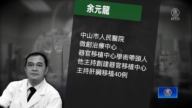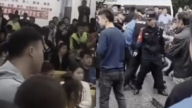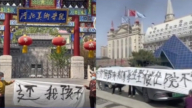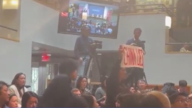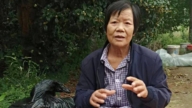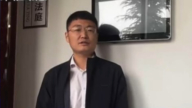【新唐人2013年11月27日訊】青島爆炸後 居民政府廣場抗議
位於山東青島市黃島區的「中石化」輸油管發生爆炸4天後,受到影響最嚴重的近百名社區業主,11月26號聚集在黃島區政府廣場抗議,要求搬遷。
他們打著寫有「給我一個安全的家」、「黃島人民強烈要求搬遷」等內容的橫幅,高喊「我要活著,我要搬遷」的口號,要求當局正視居民的生命安全。
抗議現場有大批警察戒備。
據網上消息透露,當地居民準備在週六舉行更大規模抗議。
大陸《財新網》報導,有示威者表示,當地開設了很多化工廠,長年排放有毒氣體和污染物,使黃島變成了化工島。雖然居民多年來不斷反映問題,但始終沒有得到解決。
律師程海會見丁家喜遭警察毆打
北京維權律師程海,11月26號到北京第三看守所會見被當局抓捕的維權律師丁家喜時,遭到警察毆打,衣服被扯爛、鞋子被踩破。程海被強制扣留了近5個小時後,才得以離開。
程海告訴《新唐人》記者,看守所有5名警察參與毆打他,其中為首的是副所長。
按照中共的相關法律,律師會見當事人時,經當事人同意可以錄音錄像。程海會見丁家喜時,也和前幾次一樣,經丁同意後進行錄音。會見進行20分鐘時,看守所警察以錄音沒有經過丁同意為由中斷會見,並搶走了錄音筆和程海的手機。雙方於是發生衝突,程海被拖打和非法拘禁。
谷歌總裁:「社交媒體推動中國自由。」
美國互聯網搜索引擎「谷歌」公司總裁埃里克•施密特,11月25號在倫敦發表講話,他說,社交媒體將會給中國帶來自由開放。
施密特是在英國「皇家國際事務研究所」舉行的會議上發表這一觀點。他說,社交媒體在中國的崛起,讓越來越多的中國人上網,將導致中共政府最終無力終止這一向自由開放前進的變化。
而「微博」的越來越普及,和即時通訊網站「微信」的日益增長,也將使當局的審查變得越來越困難。
施密特說,當局不可能把太多老百姓關進監獄,即使當局不喜歡社交媒體,他們也沒有辦法阻止它的發展。
編輯/周玉林
Qingdao Residents Demand Safe Homes after Explosion
After the Sinopec pipeline explosion in Huangdao District of
Qingdao, Shandong, nearly a hundred local business owners
protested at the Huangdao government square on Nov 26th.
They demanded to relocate because of the damage they have
suffered from the explosion.
Holding banners stating “Give me a safe home" and
“Huangdao people strongly urge to move" they shouted,
“I want to live, I want to move." They demand the government
face the issue about the safety of residents.
There are a large number of police on guard at the protest.
According to online sources, local residents are ready to hold
a much larger scale protest on Saturday.
Caixin.com reported that some demonstrators have revealed
that there have been many chemical plants in Huangdao.
For years, these plants have released toxic gases and
pollutants and turned Huangdao into a chemical zone.
Though years of complaining to the government have passed,
nothing has been resolved.
Police beat Ding Jiaxi’s Lawyer Cheng Hai
Cheng Hai is a Beijing human rights lawyer.
On 26 Nov, during his meeting with Ding Jiaxi, also a
human rights lawyer who is detained by the authorities,
Cheng Hai was beaten by the police.
His clothes were torn and his shoes were broken.
The police forcibly kept him for nearly five hours before
they released him.
Cheng Hai told the NTD reporter that all five members at the
detention center were involved in beating him, led by the
deputy director.
In accordance with Chinese law, with the approval of the
defendant, a lawyer is allowed to conduct recordings.
During this meeting, upon Ding’s approval, Cheng Hai
recorded the conversation just like in previous meetings.
20 minutes into the meeting, the police interrupted them and
snatched Cheng’s recording device and cell phone with the
excuse that Cheng had not obtained Ding’s agreement to record.
The conflict took place and Cheng Hai was dragged out and
beaten then subsequently illegally detained.
Google CEO: Social media will drive Chinese liberalization.
Speaking at a London conference, Google CEO Eric Schmidt
said the rise of social media in China will lead to liberalization.
Schmidt addressed his opinion in a conference organized
by the independent policy institution Chatham House.
He said that with the rise of social media in China, and more
and more people go online, China’s government will be
powerless to halt the changes and it will cause a liberalization.
The growing popularity of services like Weibo, and instant
messaging site WeChat will make censorship increasingly
difficult, he said.
Schmidt said the China’s government simply cannot imprison
enough Chinese people, and won’t be able to stop it even
if they don’t like it.
Interview & Edit/ZhouYulin



